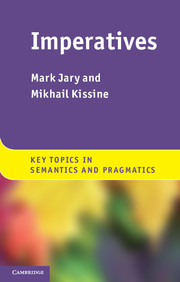Book contents
- Frontmatter
- Contents
- Acknowledgements
- List of abbreviations and notation
- Introduction
- Part I The data
- Part II The theories
- An opinionated conclusion
- Appendix A Possible worlds and semantics
- Appendix B Modality in possible-word semantics
- Appendix C Stalnaker’s common-ground model of assertion
- Glossary
- References
- Index
Introduction
Published online by Cambridge University Press: 05 July 2014
- Frontmatter
- Contents
- Acknowledgements
- List of abbreviations and notation
- Introduction
- Part I The data
- Part II The theories
- An opinionated conclusion
- Appendix A Possible worlds and semantics
- Appendix B Modality in possible-word semantics
- Appendix C Stalnaker’s common-ground model of assertion
- Glossary
- References
- Index
Summary
If language is a toolbox, then imperative sentences are what we reach for when we want to leave our hearer in no doubt that we want him to do something and what we want him to do. This is not to say that this is the only thing they are good for, nor that there is nothing else in the toolbox that will do the job, but simply to state that imperatives appear in some way designed for the job of getting the hearer to do something. We’ll have plenty to say in Chapter 1 about just what an imperative sentence is, but, for the moment, we can make do with a few examples:
(1) Stand by your man.
(2) Mind the gap.
(3) Love thy neighbour.
(4) Do not go gentle into that good night.
(5) Please try to be good.
(6) Somebody call a doctor!
(7) Do help yourself to more tea, vicar.
(8) Don’t anyone move.
What these examples show is that we take imperatives to be of a certain morpho-syntactic type. That a sentence can be used to get someone to do something does not suffice to make it an imperative. That is why we do not count (9) and (10) as imperatives. Again, we’ll have much more to say on this in Chapter 1, where we’ll also examine imperatives in languages other than English.
(9) All children must be accompanied by both parents.
(10) Can you pass the salt, please?
- Type
- Chapter
- Information
- Imperatives , pp. 1 - 6Publisher: Cambridge University PressPrint publication year: 2014

